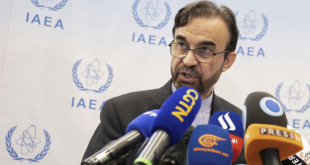TEHRAN (FNA)- Iran’s military is due to start three days of war games on Monday.
The three-day exercise to include examination of antiaircraft systems, is aimed at upgrading army’s combat preparedness, deterring US and Israeli from attacking Islamic Republic
Iran’s Army Islamic Revolution Guards Corps (IRGC) forces will take part in the exercise.
The maneuvers are aimed at maintaining and upgrading combat preparedness of the relevant units, introducing innovation and capabilities of aircraft defense experts and test new weapons and defense plans.
The location of the maneuver has not been disclosed.
Iranian Army’s chief of staff General Atallah Salehi announced last Tuesday that the Iranian air force would be holding a comprehensive military drill dubbed Modafean-e Aseman (Defenders of Sky) during the month of Ramadan, which had just begun in the country. It is unclear whether he was referring to Monday’s exercise or to a different maneuver.
In a ceremony in honor of the new air force commander General Hassan Shah Safi, Salehi said that a number of new locally-produced fighter jets will be presented throughout the year.
On Sunday, the country’s Chief Navy Commander Rear Admiral Habibollah Sayyari said Iran is upgrading its naval fleet with a new generation of domestically-built submarines.
The IRGC completed military maneuvers in the Persian Gulf called Payambar-e Azam 3 (Great Prophet III) in mid July to improve combat readiness and capability. Iran also successfully test fired new long- and medium-range missiles in the drills, including the upgraded version of Shahab-3 ballistic missiles capable of destroying targets within a 2,000-kilometer range.
The defense preparations come as Israel continues to threaten to attack Iran, a signatory to the Non-Proliferation Treaty (NPT), over its nuclear activities.
Israel and its close ally the United States accuse Iran of seeking a nuclear weapon, while they have never presented any corroborative document to substantiate their allegations. Both Washington and Tel Aviv possess advanced weapons of mass destruction, including nuclear warheads.
Iran vehemently denies the charges, insisting that its nuclear program is for peaceful purposes only. Tehran stresses that the country has always pursued a civilian path to provide power to the growing number of Iranian population, whose fossil fuel would eventually run dry.
Iran insists that it should continue enriching uranium because it needs to provide fuel to a 300-megawatt light-water reactor it is building in the southwestern town of Darkhoveyn as well as its first nuclear power plant in the southern port city of Bushehr.
In early June, Israel conducted a military maneuver over the eastern Mediterranean and Greece in preparation, according to Pentagon officials, for an aerial bombardment of Iranian nuclear facilities.
Over 100 Israeli F-16s and F-15s partook in the exercise, which spanned some 900 miles, roughly the distance between their airfields and a nuclear enrichment facility in the central Iranian city of Natanz.
The United States has also always stressed that military action is among its main options on the table.
In response, Iran has warned it could close the strategic Strait of Hormoz if it became the target of a military attack over its nuclear program.
Strait of Hormoz, the entrance to the strategic Persian Gulf waterway, is a major oil shipping route.
Intensified threats by Tel Aviv and Washington of military action against Tehran are in direct opposition to a recent report by 16 US intelligence bodies which endorsed the civilian nature of Iran’s nuclear plans and activities.
Following the US National Intelligence Estimate (NIE) and similar reports by the IAEA head – one in November and the other one in February – which praised Iran’s truthfulness about key aspects of its past nuclear activities and announced settlement of outstanding issues with Tehran, any effort to impose further sanctions or launch military attack on Iran seems to be completely irrational.
The February report by the UN nuclear watchdog, the International Atomic Energy Agency, praised Iran’s cooperation in clearing up all of the past questions over its nuclear program, vindicating Iran’s nuclear program and leaving no justification for any new UN sanctions.
The UN nuclear watchdog has also carried out at least 14 surprise inspections of Iran’s nuclear sites so far, but found nothing to support West’s allegations.
Following the said reports by the US and international bodies, many world states have called the UN Security Council pressure against Tehran unjustified, demanding that Iran’s case must be normalized and returned from the UNSC to the IAEA.
Meantime, a recent study by the Institute for Science and International Security (ISIS), a prestigious American think tank, found that a military strike on Iran’s nuclear facilities “is unlikely” to delay the country’s program.
 Eurasia Press & News
Eurasia Press & News


